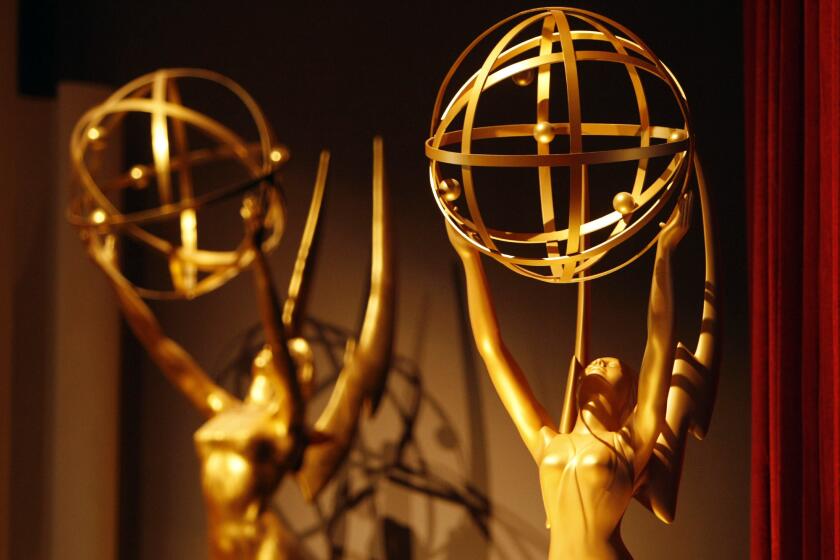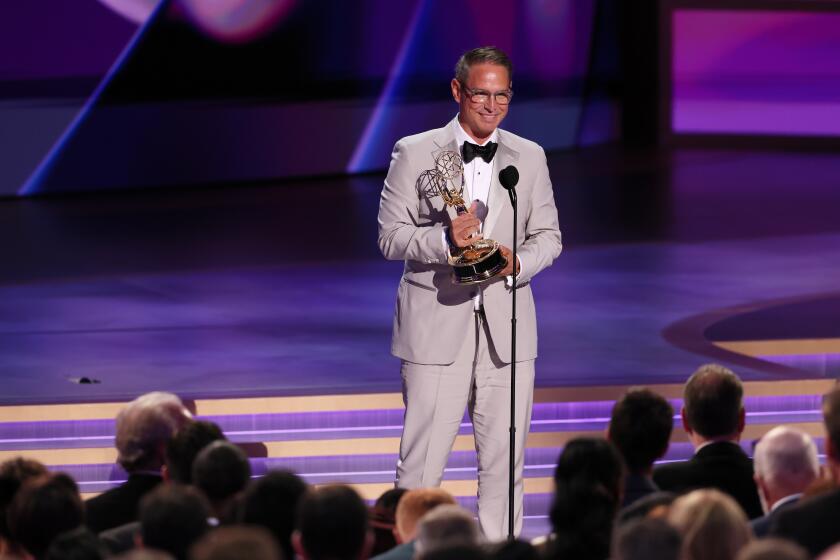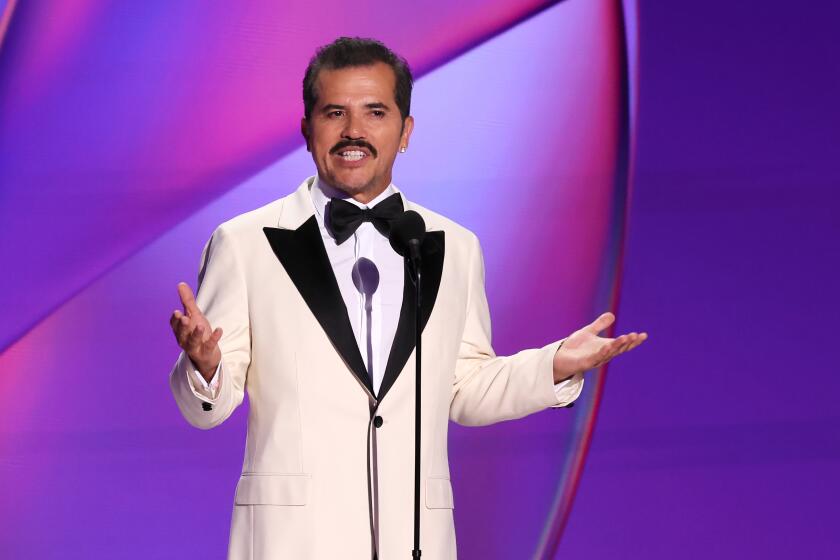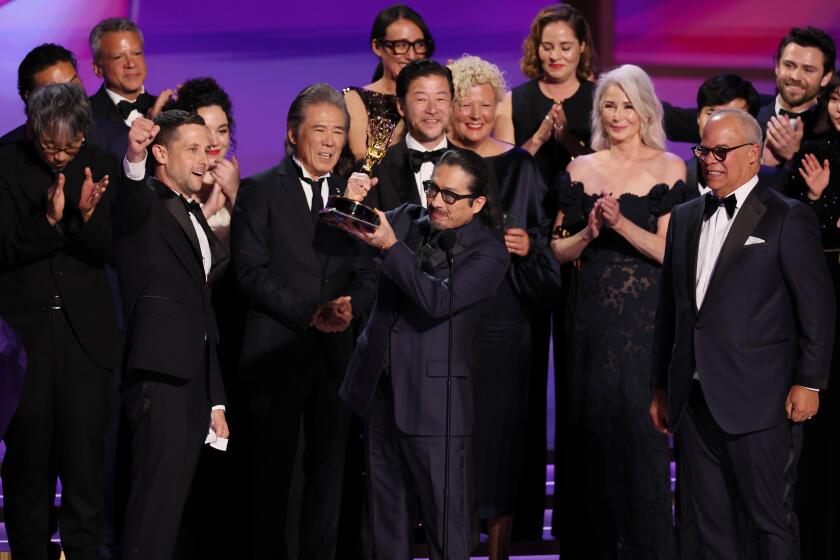Commentary: Fantasy collides with reality as Emmy voters reward ‘Thrones,’ rebuke Trump
Fantasy collided with reality when the nominations for the 71st Emmy Awards were announced Tuesday: The Television Academy overwhelmingly chose to fly with dragons and tackle real-world racism, all in the same election cycle.
The final season of “Game of Thrones” — by far its weakest — landed 32 nominations, the most ever for a drama series in a single season. But a new crop of nominees suggests that the industry is also looking beyond Westeros and toward a place called Earth.
Netflix’s powerful limited series “When They See Us” landed a surprising 16 nominations, an astounding feat for a hard-hitting, often painful docudrama about the wrongful conviction of the Central Park Five.
The four-part series chronicles the true story of the black and Latino teens charged with the brutal assault and rape of a Central Park jogger in 1989, taking viewers on a two-decade journey from that night in the park to their exoneration — and beyond. Directed and co-written by Ava DuVernay, it explores how systemic racism clouded the way the media, law enforcement and the courts dealt with the boys’ cases.
The strong performance of “When They See Us,” including nominations for actors Jharrel Jerome, Niecy Nash and six others, was one of the bigger stories coming out of this year’s crop of contenders. Despite their love of Iron Thrones and three-eyed ravens, it’s clear that Emmy voters are paying attention to more pressing issues too.
The 2019 Creative Arts Emmys have been awarded, and winners are notated on our Emmy nominations list.
News of the Netflix drama’s Emmy haul was released within the same hour that federal prosecutors announced they would not seek civil rights charges against Daniel Pantaleo. Eric Garner, who was African American, died in 2014 after the officer put him in a chokehold. “When They See Us” speaks directly to many of the issues that stoked uprisings before and after Garner’s death, from the distrust between the black community and police to the judicial double standard that confronts people of color.
And where there’s racial tension, there’s Trump to fan the flames. Since “When They See Us” premiered in May, there’s been a back-and-forth between the president and reporters (not to mention DuVernay herself) regarding his reaction to the case in 1989. Trump, then a real estate developer, took out ads in the local New York papers to “BRING BACK THE DEATH PENALTY. BRING BACK OUR POLICE!”
When asked if he’d apologize to the men who’ve said their confessions were coerced, Trump said: “They admitted their guilt ... and if you look at some of the prosecutors, they think that the city should never have settled that case, so we’ll leave it at that.”
The Television Academy’s support for the series feels like a direct rebuke to the president. In addition to Trump appearing in the series via archival footage, in which he declares he would “love to be a well-educated black,” the Emmy nominations come on the heels of his latest wave of unvarnished racist rhetoric: On Sunday, Trump tweeted that four congresswomen of color, all of whom are Americans, should “go back” to where they came from.
No word yet if Trump plans to return to reality TV if this second-term deal doesn’t work out.
The academy’s 24,000-plus voters, all TV industry folk, were apparently listening when Trevor Noah and his “Daily Show” Emmy campaign advised: “Don’t ‘Green Book’ this one, guys.” In other words, “Don’t be the Oscars” and honor a production that many complained was as tone-deaf and out of touch as, well, the film academy.
In the upcoming HBO miniseries “Chernobyl,” Jared Harris plays Valery Legasov, the real-life scientist the Soviet government called when an accident at the Chernobyl nuclear power plant was reported.
Another standout nominee that tackles a topical, news-making event is HBO’s true-to-life masterpiece “Chernobyl.” Also competing in the limited series categories, it earned 19 nominations.
Starring Jared Harris as a scientist determined to get to the bottom of the 1986 explosion of a nuclear reactor in Soviet Ukraine, the drama focuses as much on the political fallout as the nuclear one. Among the highest hurdles Harris’ character faces in dealing with the breadth of the disaster is navigating the misinformation spun by a secretive government. It vividly illustrates how dire the consequences can be when the truth no longer matters. Though the series didn’t need to spell it out, “Chernobyl” viewers likely saw parallels to the here and now.
Many other contenders also reflect the darker culture from which they sprang. The cutthroat politics of an influential media mogul and his greedy heirs fuels “Succession,” while flat-out nihilism is the comic currency of much of “Fleabag.” Of the other comedy nominees, one is about a pair of New Yorkers who can’t stop dying, one is about the adventures of a hit man/aspiring actor and a third is about the stunning incompetence in Washington.
Any question as to why we still need our fantasy fix?
To wit, the whimsical Amazon comedy “The Marvelous Mrs. Maisel” came in second overall with 20 nominations. Set in the highly stylized 1950s New York of creator Amy Sherman-Palladino, it touches on feminist themes, but mostly it’s a nostalgic trip through a technicolor city that never existed.
The fantasy’s epic final season adds an Emmy feather to its cap with a record-breaking 32 nominations. And deservedly so.
And nominations hog “Game of Thrones” beat the 25-year record set by “NYPD Blue,” a series celebrated for its gritty realism, with its messiest season ever. Voters had to squint hard not to see the coffee cup and water bottle left in shots from “The Last of the Starks” and “The Iron Throne” — both nominated for outstanding direction — and ignore the unsatisfying ending for every character on the show but the one we cared about least, Bran.
In other words, the nominations were a farewell gift for an otherwise great series and perhaps a farewell to the less contentious era in which it premiered — when the line between fantasy and nonfiction wasn’t negotiable and locking children in cages was something that could happen only in Westeros.
More to Read
The complete guide to home viewing
Get Screen Gab for everything about the TV shows and streaming movies everyone’s talking about.
You may occasionally receive promotional content from the Los Angeles Times.








